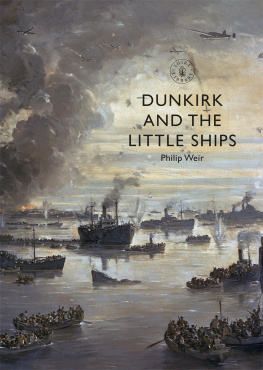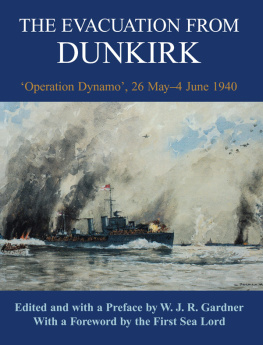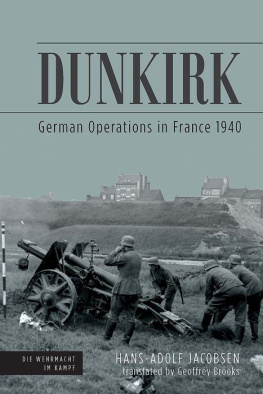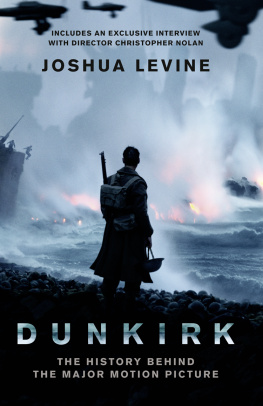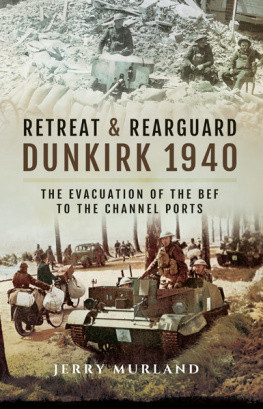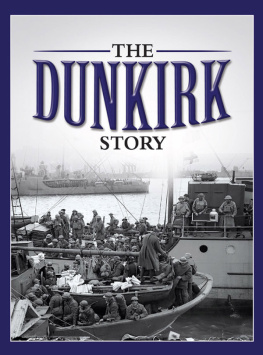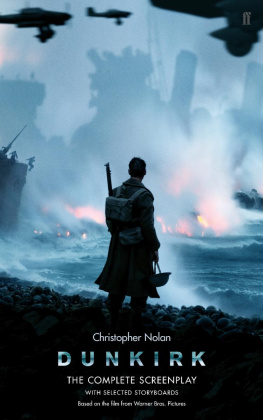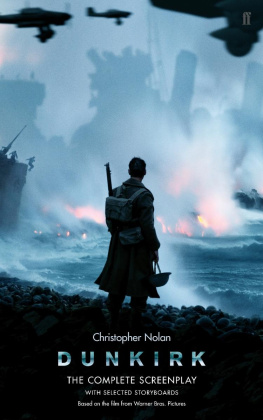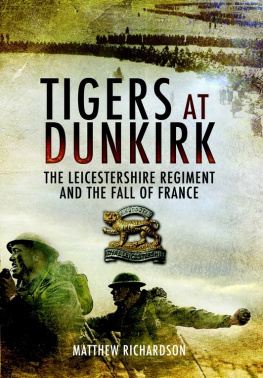John Harris - Dunkirk The Epic Story of Historys Most Extraordinary Evacuation
Here you can read online John Harris - Dunkirk The Epic Story of Historys Most Extraordinary Evacuation full text of the book (entire story) in english for free. Download pdf and epub, get meaning, cover and reviews about this ebook. year: 2021, publisher: Canelo Digital Publishing Ltd, genre: History. Description of the work, (preface) as well as reviews are available. Best literature library LitArk.com created for fans of good reading and offers a wide selection of genres:
Romance novel
Science fiction
Adventure
Detective
Science
History
Home and family
Prose
Art
Politics
Computer
Non-fiction
Religion
Business
Children
Humor
Choose a favorite category and find really read worthwhile books. Enjoy immersion in the world of imagination, feel the emotions of the characters or learn something new for yourself, make an fascinating discovery.
- Book:Dunkirk The Epic Story of Historys Most Extraordinary Evacuation
- Author:
- Publisher:Canelo Digital Publishing Ltd
- Genre:
- Year:2021
- Rating:5 / 5
- Favourites:Add to favourites
- Your mark:
- 100
- 1
- 2
- 3
- 4
- 5
Dunkirk The Epic Story of Historys Most Extraordinary Evacuation: summary, description and annotation
We offer to read an annotation, description, summary or preface (depends on what the author of the book "Dunkirk The Epic Story of Historys Most Extraordinary Evacuation" wrote himself). If you haven't found the necessary information about the book — write in the comments, we will try to find it.
Dunkirk The Epic Story of Historys Most Extraordinary Evacuation — read online for free the complete book (whole text) full work
Below is the text of the book, divided by pages. System saving the place of the last page read, allows you to conveniently read the book "Dunkirk The Epic Story of Historys Most Extraordinary Evacuation" online for free, without having to search again every time where you left off. Put a bookmark, and you can go to the page where you finished reading at any time.
Font size:
Interval:
Bookmark:


I have myself full confidence that if all do their duty and nothing is neglected and if the best arrangements are made, we shall prove ourselves once again able to defend our island home, ride out the storms of war, and outlive the menace of tyranny if necessary for years, if necessary alone. At any rate, that is what we are trying to do. That is the resolve of the Government, every man of them. It is the will of Parliament and of the nation.
The British Empire with the French Republic, linked together in their cause and in their need, will defend to the death their native soil, aiding each other like good comrades to the utmost of their strength, even though large tracts of Europe and many old and famous States have fallen or may fall into the grip of the Gestapo and all the odious apparatus of Nazi rule.
We cannot flag or fail. We shall go on to the end. We shall fight in France, we shall fight on the seas and oceans, we shall fight with growing confidence and growing strength in the air. We shall defend our island whatever the cost may be. We shall fight on the beaches, we shall fight on the landing-grounds, in the fields, in the streets, and in the hills.
We shall never surrender, and even if, which I do not for a moment believe, this island or a large part of it were subjugated and starving, then our Empire beyond the seas, armed and guarded by the British Fleet, will carry on the struggle until in Gods good time the New World, with all its power and might, sets forth to the liberation and rescue of the Old.
Winston Churchill
House of Commons
4 June 1940
For the British people, 1940 was an incredible year. It was the one year of World War II that nobody who lived through it will ever forget. It was a year of history that began in the gloom and frustration of the black-out and the Phoney War, and ended with the British people having been through Dunkirk, the Battle of Britain and the Blitz.
From a smug self-satisfaction that, throughout the country from the Cabinet downwards, was reflected in the view that the British Empire could never be beaten, Britain descended to the brink of disaster, where she was to cling tooth and nail, alone and unaided, until the entry of Russia and then the United States into the war made certain its end. It was a traumatic year, and of everything that happened probably nothing created quite such a shock as the first great disaster, Dunkirk.
To the men then serving in the Forces, the word Dunkirk is still tremendously evocative. In the way that names such as Mons, the Somme and Passchendaele could be unbelievably moving to the men of World War I, so Dunkirk, Alamein and D-Day have become to those who grew to manhood after 1918. And, in the way that Mons sums up for that earlier generation the picture of a battered small army fighting with skill and courage against tremendous odds, so does Dunkirk to the later one.
Dunkirk produced a whole crop of legends, chief among which was that hundreds of amateur yachtsmen spontaneously leapt in a body to the rescue of the British Expeditionary Force with their weekend boats. It was not so. The evacuation of troops from Dunkirk was the result of foresight and planning and, despite the undoubted and splendid assistance of civilians, the largest percentage of the troops were rescued by Navy-manned vessels, while most of the civilians who took part were professional seamen merchant sailors, fishermen, trawlermen and operators of harbour craft.
In addition to the seaborne operation, it should not be forgotten that Dunkirk was a military operation also a hard-fought retreat with a magnificent last stand by the rearguard to allow the bulk of the troops to get clear. The actions of the three Services cannot be separated. The Navy could never have done what it did if the Army had not disengaged itself so successfully. The Royal Air Forces contribution, small as it had to be, was also vital.
This book does not attempt to tell the whole story of the retreat and evacuation, and does not cover the history of all the units involved. To attempt to describe the period in detail would merely be confusing to the reader, so, instead, I have tried to give a broad view, concentrating on the sound and the feel and the smell, which, after all, is as much the stuff of history as dates and figures. I have tried also to let events appear in chronological order and as near as possible to the time when they occurred, something that was not always easy, because Dunkirk happened a long time ago and as memories fade, dates grow confused. Nevertheless, I am very much indebted to the Dunkirk Veterans Association and to those ex-soldiers, sailors and airmen, now growing old, who told me their stories with such surprising modesty.
Ever since 3 September 1939, first the French, then as soon as they could take up their positions the British, had faced the Germans along the Franco-German border.
The war had been a long time coming ever since 1918, when French demands for reparations after World War I had beggared Germany, yet at the same time had prevented her earning the means to pay them. But while the 10 million dead of that war laid a cold shadow over the generation they had died to save, isolationism in America, pacifism in England and defeatism in France had been matched by increasingly aggressive demands by Germany to return to her full status, which made it easy for Adolf Hitler to stir up trouble.
Feeling they had been cheated in World War I, deprived of their colonies and the Saar, forced to give back Alsace-Lorraine, and with the Rhineland occupied and Danzig a free city, the Germans were ripe for Nazi theories. Marshal Foch, the Allied leader at the end of World War I, had realised that what had happened in 1918 was not peace, only a break in hostilities. His armistice for 20 years was a remarkably accurate forecast. Bitterness and propaganda helped Hitler on his road to vengeance, aided all the way by woolly-minded dreamers at the League of Nations, whose good intentions for the most part seemed to consist of depriving their own country of arms while not depriving Germany.
Most people in Europe hated the thought of another conflict. They were terrified by the development of modern weapons, particularly bombers, and, trading on these fears, Hitler prepared for war and chose the moment for launching it. From the minute he came to power it was inevitable.
While weak statesmanship had permitted Germany to grow stronger and stronger, the war weariness that followed 1918, financial crises, the worst depression in living memory and a variety of pacifist movements had brought the British armed services to a dangerous level of inadequacy. As Clement Attlee acidly remarked: There seemed to be a feeling that an inefficient army was more moral than an efficient army.
The Royal Navy had managed to retain most of its strength, though much of it was out of date. The RAF, by acquiring sufficient single-wing Spitfires and Hurricanes to replace its obsolete biplanes during the breathing space afforded by Prime Minister Neville Chamberlains concessions to Hitler at Munich, could match the German Luftwaffe in quality, though never in quantity. The Army, however, was in poor shape equipment-wise, though never in spirit. Only a few far-sighted officers had realised that the tank, that British World War I invention, was the symbol of the new type of warfare, with the result that in Britain when war began there was virtually no tank force worth noting at a time when the Germans had evolved the Blitzkrieg.
Font size:
Interval:
Bookmark:
Similar books «Dunkirk The Epic Story of Historys Most Extraordinary Evacuation»
Look at similar books to Dunkirk The Epic Story of Historys Most Extraordinary Evacuation. We have selected literature similar in name and meaning in the hope of providing readers with more options to find new, interesting, not yet read works.
Discussion, reviews of the book Dunkirk The Epic Story of Historys Most Extraordinary Evacuation and just readers' own opinions. Leave your comments, write what you think about the work, its meaning or the main characters. Specify what exactly you liked and what you didn't like, and why you think so.







